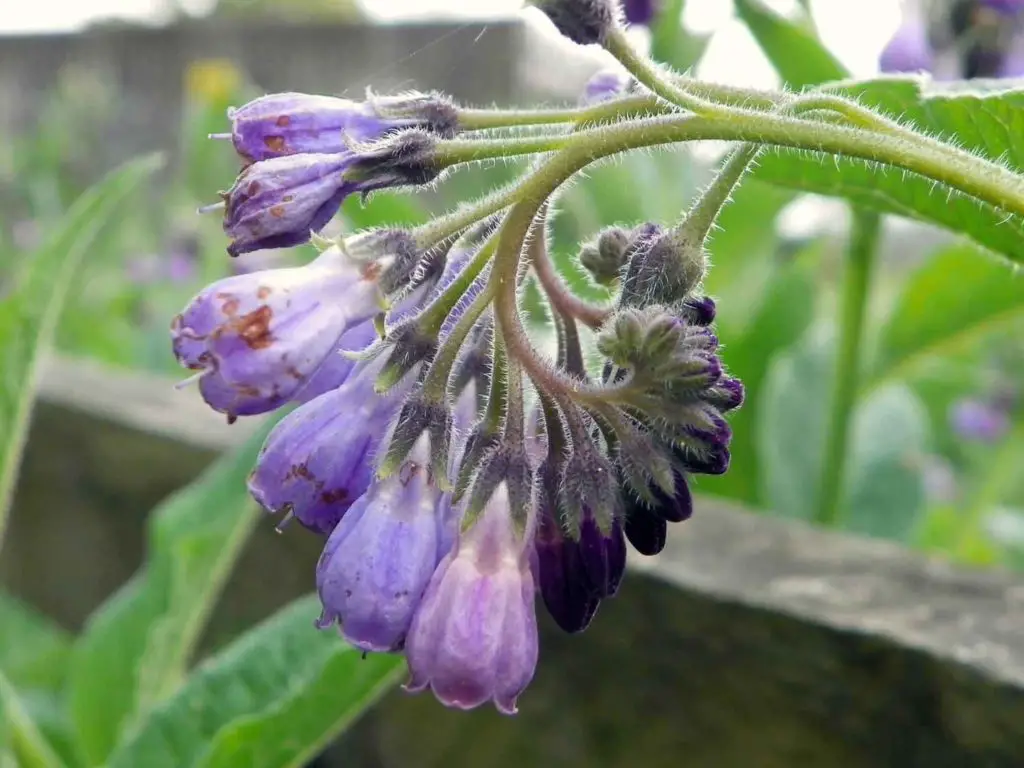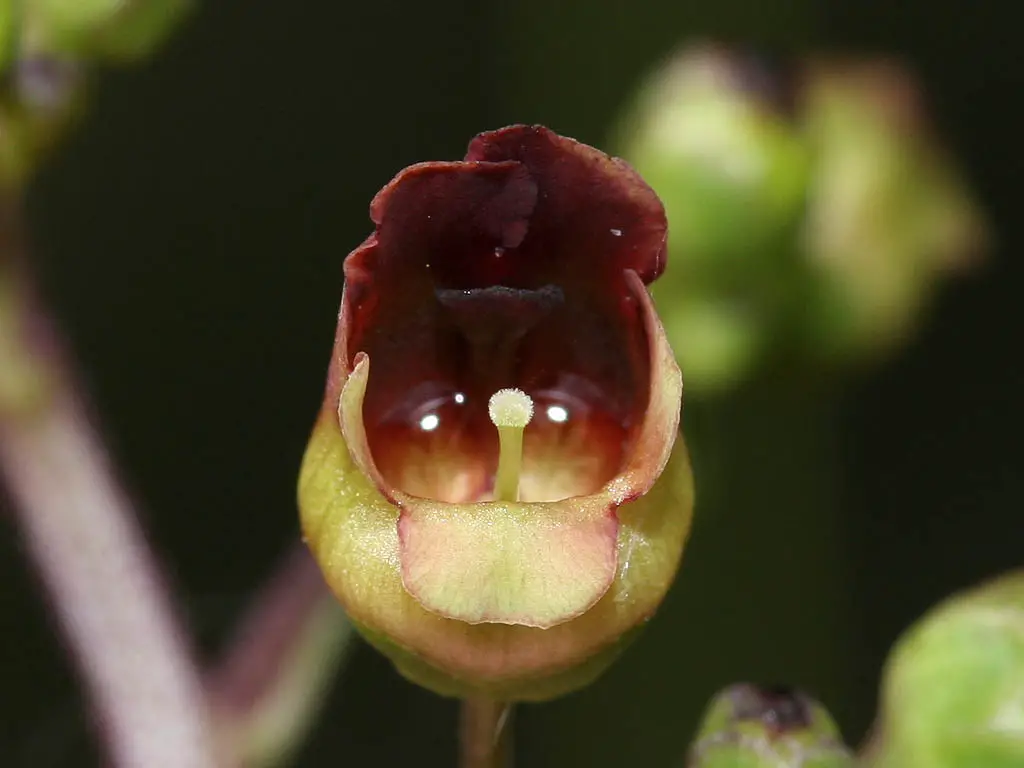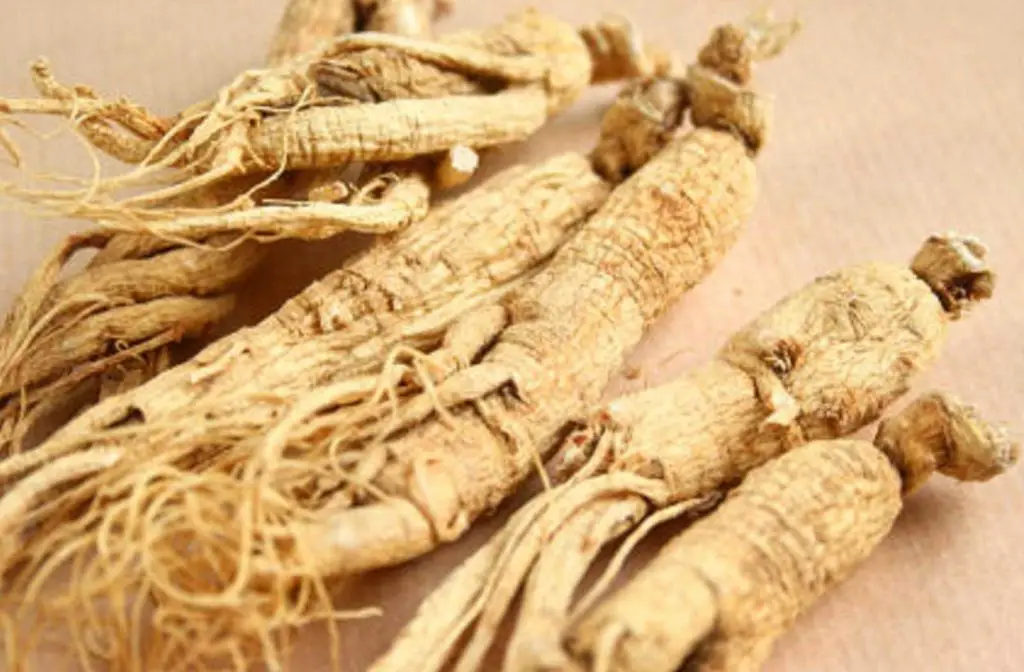What is Ashwagandha
Ashwagandha or Withania somnifera is an essential part of Indian Ayurveda. This plant is also commonly known by its other names: Indian winter cherry, Indian ginseng, Ashvagandha, Ghoda Asoda, Samm Al Ferakh, Turangi-Ghanda, Cerise d’Hiver, and Ayurvedic Ginseng. [1][2]
The origin of this ayurvedic plant can be traced back to India and Southeast Asia. [3]. As a plant native to the warm regions, Ashwagandha grows optimally in dry parts of the sub-tropical areas of India, particularly in Madhya Pradesh, Rajasthan, Gujarat, Maharashtra, Punjab, Haryana, and Uttar Pradesh. [3][4]
Ashwagandha is an annual, perennial shrub growing up to 1.5 meters in height. [4][5]. This plant grows a broad evergreen leaf with a densely hairy underleaf. Ashwagandha also develops a pale green flower with 4 to 5 petals at the leaf nodes. [5]
In ayurvedic practices, this plant is mainly used as an “adaptogen.” Adaptogens are herbal-based substances that help the body cope with physical and mental stress[6]. Moreover, Ashwagandha is also known to produce anxiolytic effects, aid in weight loss, and enhance sperm quality. [1][7]
Ashwagandha Benefits and Uses
Ashwagandha has been a critical ayurvedic plant in Indian culture. Because of the plant’s manifold benefits, the natives would often consider Ashwagandha as a Rasayana. A Rasayana is a concoction believed to promote physical and mental youthfulness. [2]
Weight Loss
According to a study directed at understanding the correlation between Ashwagandha and weight loss, the ayurvedic indirectly reduced the weight of the experimental group. In this study, the researchers pointed out chronic stress as one of the primary causes of obesity or rapid weight gain. By treating the participants’ stress with Ashwagandha, they were able to see a significant improvement in their weight. [8]
Chronic psychological stress is a significant health problem worldwide [9]. This psychological health concern has been the cause of many diseases such as heart complications, depression, gastrointestinal imbalance, and obesity [10]. The manner in which Ashwagandha helped reduce the weight of the participants in this study could prove the many beneficial uses of the plant.
Adaptogen
The earliest known use of Ashwagandha as an adaptogen dates back to 6000B.C. [2]. Adaptogens are natural substances that help the body cope with physical and mental stress. They work by normalizing the body’s stress response and enhancing its resistance to stressors. [6][11]
Many studies directed at investigating the adaptogenic action of Ashwagandha show positive results. [2]. In a study done on rats, researchers identified that Ashwagandha was able to help the rats adapt to stressful conditions, as seen in the evident decline in their plasma corticosterone. [12]
Infertility
In a study conducted to analyze the medicinal effect of Ashwagandha in oligospermia, researchers found that the plant had a positive impact on the participants’ sperm analysis parameters. The experimental group saw a 167% increase in sperm count, 53% in sperm volume, and 57% in sperm motility. [7]
Male infertility is a pressing global health problem as it has been shown that male infertility accounts for 20-70% of infertility cases worldwide. [13]. The most common cause of male infertility is low sperm count or oligospermia. Oligospermia is a medical condition characterized by a sperm count lower than 15 million per milliliter of semen. [14]
Anxiolytic
Ashwagandha has also been shown to produce anxiolytic effects. In a study done with 58 participants, the experimental group showed a significant decrease in perceived stress scale score. This decline in PSS score proves that Ashwagandha helps manage anxiety and stress levels. [2][11]
Anxiety is a mental health condition characterized by fear, worry, and uneasiness. [15] It is one of the most common mental disorders in the United States. In fact, according to the National Institute of Mental Health, 18.1% of American adults suffer from anxiety. [16]
Anxiety can be debilitating as it can interfere with an individual’s daily activities. The anxiolytic use of Ashwagandha can help reduce anxiety symptoms and improve the quality of life of those suffering from this condition.
Improves Energy
Ashwagandha has also been shown to improve energy levels by protecting the mitochondria. In a study conducted to understand the glycosaminoglycan synthesis of Ashwagandha, researchers found that the plant prevented the oxidation of mitochondria in the granulation tissue. Furthermore, Ashwagandha also decreases the succinate dehydrogenase enzyme activity in tissue mitochondria. [2][17]
Mitochondrial health is vital for maintaining energy levels as the mitochondria are responsible for producing energy (ATP) in the cells. [18]. Therefore, by protecting the mitochondria from damage and keeping them healthy, Ashwagandha helps to improve energy levels.
Anti-inflammatory
Historically, boiled Ashwagandha roots and leaves were also used to treat ulcers, wounds, and swellings. [2]. In a study done to understand the anti-inflammatory effect of Ashwagandha, researchers found that the plant extract could inhibit the inflammatory response by reducing the levels of pro-inflammatory cytokines. [19]
The active components of Ashwagandha responsible for its anti-inflammatory effect are Withaferin A and 3-b-hydroxy-2,3-dihydro withanolide F. [2].
Withaferin A is a steroidal lactone extracted from processing W. somnifera. This compound has been shown to have various medicinal properties such as anti-inflammatory, immunomodulatory, and anticancer effects. [20]. 3-b-hydroxy-2,3-dihydro withanolide F is another compound found in Ashwagandha that was also proven to help in reducing inflammations in the body. [21]
Read Also: What is the Best Ashwagandha? KSM-66 vs Sensoril Compared
Anti-arthritic
There’s a comprehensive collection of literature documenting the anti-arthritic effects of Ashwagandha. [2]
In a study done to understand the impact of Ashwagandha on arthritis, researchers found that the plant could reduce the severity of arthritis with the weekly treatment of 600 to 800mg of Ashwagandha powder in rats [22]. Furthermore, the study also showed that Ashwagandha helped suppress joint pain and reduce joint stiffness. [2]
Arthritis is a condition characterized by the inflammation of the joints. It is estimated that almost 350 million people worldwide are suffering from arthritis. The identifiable symptoms of arthritis include joint pain, stiffness, and swelling [23]. These symptoms can be debilitating and interfere with an individual’s quality of life.
Ashwagandha Dosage
In most controlled studies conducted to determine the pharmaceutical benefits of Ashwagandha, researchers often use 500 to 600mg of pure Ashwagandha powder [9][22][23]. However, several medical professionals suggest an ideal dosage of Ashwagandha products depending on the intended use. [23]
- For anxiolytic use: A regular intake of 500 to 600mg of Ashwagandha extract for at least a month is sufficient to manage anxiety and stress levels.
- For blood sugar control: Evidence suggests that a daily intake of 250mg of Ashwagandha could help in blood sugar management. [25]
- As an aphrodisiac: A daily intake of at least 5 grams of Ashwagandha for at least three months could help in promoting sperm motility, concentration, and volume.
- For muscle growth and energy levels: Many studies on muscle growth and energy levels show that a daily intake of 500mg of Ashwagandha within eight weeks is beneficial for muscle growth and strength levels.
- For anti-inflammatory use: A daily intake of 250mg of Ashwagandha supplements or 12ml of Ashwagandha extracts could boost immunity which can help alleviate inflammation and infection.
- As an adaptogenic: Many studies suggest that a daily intake of 500 to 600 mg of Ashwagandha supplements could improve cognitive functions.
Warnings and Contraindications
Individuals with hormone-sensitive prostate cancer should not ingest ashwagandha, as the herb may increase testosterone levels in this instance. It is possible that ashwagandha may induce abortion at high doses, so pregnant women should not take the herb as a supplement. Benzodiazepines, anticonvulsants, and barbiturates are contraindicated with ashwagandha supplementation.
Mild to moderate negative symptoms may include nausea, headache, and gastritis. Rarely, more serious side effects can occur as a result of ashwagandha consumption. For example, in a study involving a thirty-two-year-old woman with chronic fatigue, the patient experienced thyrotoxicosis, which resolved itself shortly after discontinuing supplementation. In another clinical study, a twenty-eight-year-old man experienced burning and itching of the skin and mucosal membranes. Finally, two cases were also reported in which patients underwent ventricular tachycardia.
In order to mitigate the risk of adverse side effects, individuals should be mindful of the legitimacy of their supplement manufacturers.
FAQ
How Much Ashwagandha should I take per Day
Many studies utilizing Ashwagandha dosages range from 500 to 600mg per day. However, some studies suggest that lower dosages of Ashwagandha also yield favorable effects [9][22][23][25].
Daily dosages may vary depending on the intended use of Ashwagandha. A lower dosage may be sufficient for blood sugar management, while a higher dosage is necessary to obtain the muscle-building effects of Ashwagandha.
When To Take Ashwagandha
Many medical professionals approve of the daily use of Ashwagandha supplements or extracts. Evidence also suggests that long-term and consistent use of Ashwagandha supplements could provide more significant results. [24][25][28]
However, Ashwagandha may exert unwanted interaction with blood pressure and blood sugar medications despite its favorable benefits. [24] Because of this, people who are taking these medications must be extra careful when taking Ashwagandha.
Another known side effect of Ashwagandha is stomach discomfort. Medical professionals advise individuals to take Ashwagandha supplements with a full stomach to prevent this side effect. [28]
Does Ashwagandha Make You Sleepy
There’s a particular study conducted to determine how Ashwagandha affects insomnia and anxiety. In this study, the researcher found that Ashwagandha could help insomnia symptoms at 300mg extracts taken twice daily. [27] This study proves that the anxiolytic effect of this Rasayana herb is strong enough to even help individuals with chronic insomnia.
Do I Take Ashwagandha in the Morning or Night
Ashwagandha-derived supplements are safe to take in the morning or at night. Whatever time you choose to take this ayurvedic plant depends mainly on what supplemental form and benefits you want to reap from the medicinal plant. [26]
For example, suppose you want to use Ashwagandha as part of your daily supplement routine to boost energy and cognitive functions. In that case, it is best to ingest an Ashwagandha supplement in the morning. This will help you obtain the energy-boosting benefits of Ashwagandha while keeping anxiety at bay throughout your day. [26]
On the other hand, if you’re seeking to use Ashwagandha as a stress-reducer and to promote better sleep, it is best to mix Ashwagandha powder with your evening tea or milk. This will help you obtain the calming effects of Ashwagandha before bedtime. [26]
References:
- https://www.webmd.com/vitamins/ai/ingredientmono-953/ashwagandha
- https://www.ncbi.nlm.nih.gov/pmc/articles/PMC3252722/#R1
- https://www.ncbi.nlm.nih.gov/books/NBK548536/#:~:text=Ashwagandha%20is%20an%20Ayurvedic%20herb,to%20India%20and%20Southeast%20Asia
- https://agritech.tnau.ac.in/farm_enterprises/Farm%20enterprises_%20Ashwagantha.html#:~:text=It%20grows%20in%20dry%20parts,in%20more%20than%205000%20hectare
- https://plants.ces.ncsu.edu/plants/withania-somnifera/
- https://www.webmd.com/balance/adaptogens-what-to-know
- https://www.ncbi.nlm.nih.gov/pmc/articles/PMC3863556/#:~:text=Ashwagandha%20is%20an%20effective%20herbal,and%20wellbeing%20of%20a%20person
- https://www.ncbi.nlm.nih.gov/pmc/articles/PMC5871210/
- https://www.ncbi.nlm.nih.gov/pmc/articles/PMC3573577/
- https://academic.oup.com/ajcn/article/95/4/934/4576846?login=true
- https://www.ncbi.nlm.nih.gov/pmc/articles/PMC6979308/
- https://pubmed.ncbi.nlm.nih.gov/10075127/
- https://www.ncbi.nlm.nih.gov/pmc/articles/PMC4424520/#:~:text=The%20number%20of%20infertile%20men,be%20infertile%20(Table%203).
- https://www.mayoclinic.org/diseases-conditions/low-sperm-count/symptoms-causes/syc-20374585#:~:text=Low%20sperm%20count%20means%20that,of%20sperm%20is%20called%20azoospermia.
- https://psychiatry.org/patients-families/anxiety-disorders/what-are-anxiety-disorders#:~:text=Anxiety%20refers%20to%20anticipation%20of,or%20leaving%20to%20escape%20danger.
- https://adaa.org/understanding-anxiety/facts-statistics#:~:text=Anxiety%20disorders%20are%20the%20most,of%20those%20suffering%20receive%20treatment.
- https://pubmed.ncbi.nlm.nih.gov/2963652/
- https://www.miskawaanhealth.com/blog-aboutmitochondria/#:~:text=The%20health%20of%20our%20mitochondria,and%20our%20overall%20good%20health.
- https://pubmed.ncbi.nlm.nih.gov/29620265/
- https://www.sciencedirect.com/topics/biochemistry-genetics-and-molecular-biology/withaferin-a
- https://pubchem.ncbi.nlm.nih.gov/compound/3-HDH-withanolide-F#section=Computed-Descriptors
- https://www.tandfonline.com/doi/full/10.3109/13880209.2013.835325
- https://www.singlecare.com/blog/news/arthritis-statistics/#:~:text=More%20than%20350%20million%20people,Control%20and%20Prevention%2C%202020).
- https://www.healthline.com/nutrition/ashwagandha-dosage#safety-and-side-effects
- https://pubmed.ncbi.nlm.nih.gov/11116534/
- https://www.healthline.com/nutrition/ashwagandha-in-the-morning-or-night#bottom-line
- https://www.ncbi.nlm.nih.gov/pmc/articles/PMC6827862/#:~:text=Ashwagandha%20root%20extract%20is%20a,300%20mg%20extract%20twice%20daily.
- https://www.medicinenet.com/is_it_safe_to_take_ashwagandha/article.htm






